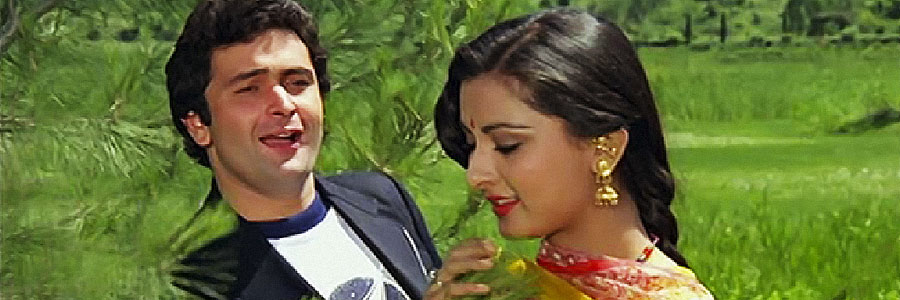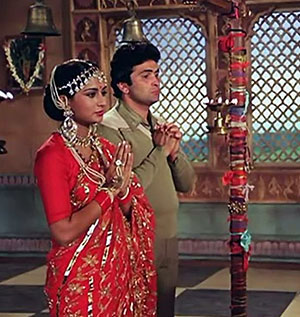
Yeh Vaada Raha

YEH VAADA RAHA (MOVIE)
Rose Movies
Original release: April 9th 1982
Running time: 150 minutes
Country of origin: India
Original language: Hindi
Director: Kapil Kapoor
Composer: R.D. Burman
Cast: Rishi Kapoor, Poonam Dhillon, Tina Munim, Shammi Kapoor, Rakhee Gulzar, Jaya Bachchan (Sunita’s voice)
In my 33 years I’ve seen many Indian films, mainly classics that run up until the early 1980’s. There’s just something timeless about them, they make me remember a time when things were much simpler, not just in the world, but also in my life, and there’s a reason why they’re referred to as “evergreen” classics. They may age, but they never get old.
Among these films is Yeh Vaada Raha, which I saw when I was just a toddler. Its story and songs have remained in my mind and heart since then, and I don’t think they’ll ever leave.

It begins with Vikram (Rishi Kapoor) praying in a temple when he sees Sunita (Poonam Dhillon) walk in. He falls madly in love with her and begins a relentless courtship to win her heart. As their romance blossoms it’s illustrated with the songs Aisa Kabhi Hua Nahi, Jeene Ko Toh Jeete Hain Sabhi and the film’s pivotal number, Yeh Vaada Raha.
It’s played on Sunita’s birthday when Vikram visits her and puts one of her records. They sing along to it, and dancing in each other’s arms, they clap their hands to the melody in a very specific way that becomes important later on.
When Vikram introduces Sunita to his mother, she strongly disapproves. As her only son and heir to a fortune and empire, she wants him to marry up into society, and with Sunita being a poor singer, she looks down on her. Undeterred, Vikram takes Sunita to the temple where they first met to ask for blessings. On the way, they sing Maine Tujhe Kabhi Kuch, another melodious and memorable song.

After they promise never to let anything part them; Vikram ties Sunita’s necklace around a wishing pole in the temple as a symbol of their love. When he returns to his mother to tell her he’s going to marry Sunita, she’s furious and tells him that marrying her will damage the family business. Vikram decides to marry her anyway, but on the way to the wedding their car is hit head-on by a truck.
Vikram is hurt but Sunita’s injuries are much worse. Lying in hospital with her entire head wrapped in bandages she’s told her face will be badly disfigured. Vikram’s mother uses the opportunity to gain the upper hand; first offering the girl money to stay away from her son and then by telling her Vikram can’t live with an ugly girl like her. It’s hearing this which tears her apart and she agrees to leave Vikram, transferring to a different hospital. His mother puts the final nail in the coffin by telling him Sunita’s dead.

The doctors at Sunita’s new hospital resort to plastic surgery in an attempt to save her face. In the months that pass we see Vikram shattered by losing her, meanwhile, with the surgery now complete, the bandages are removed and Sunita looks at her new face for the first time. She looks different now and is scared Vikram will no longer love her.
The couple don’t stop thinking of each other and remembering their times together, and the song, Yeh Vaada Raha is reprised.

Yet when Sunita arrives at Vikram’s house she’s devastated to learn that he’s engaged to another woman. Unbeknown to her, it was arranged without his knowledge by his mother. With her new face, Sunita calls herself Kusum, and though she refuses to sing anymore, she ends up on stage with Vikram and they sing together. Something in the girl’s voice reminds him of Sunita but it can’t be her – she’s dead and this girl doesn’t look anything like her.
With his wedding approaching, Vikram and Kusum/Sunita are drawn to each other and though his mother tries to interfere, destiny will eventually bring the couple back together, even if it has to take the form of a song they once shared.

Yeh Vaada Raha has always remained a favourite and over the years I’ve met many who fell in love with it for the same reasons I did. It’s a colourful film that looks gorgeous, especially in the outdoor scenes and though it was a remake of the Hollywood film, The Promise (1979), there’s something so true to the Indian style of storytelling here.
Vikram’s mother, played by Rakhee Gulzar, is not exactly a villain, but what she does to Vikram and Sunita is so unforgivable. As Tina Munim takes over the role of Sunita from Poonam Dhillon after the surgery, both actresses play the part extremely well, each balancing beauty and charisma effortlessly.

There are also some nice little touches too, such as early on when Vikram visits Sunita at her home and she has Ghar Aya Mera Pardesi playing. The song is from Awaara (1951), the film directed by and starring Raj Kapoor, Rishi’s father.
What really makes Yeh Vaada Raha standout is the film’s own songs. They strike such a chord and remain memorable over so many years. They instantly recall the scenes from the film, its story and its characters as they struggle to find their way back to each other, despite these overwhelming circumstances.

We hear the theme song several times, and for the characters, it’s like a trigger for their emotions and memories. Vikram knows there’s something familiar about Kusum but he can’t work it out, and Kusum/Sunita is not sure he will still love her, yet they made a promise to each other a long time ago.
As Vikram starts to work out it; the voice, the way she moves, looks at him and claps her hands, it all comes together and he says with tears in his eyes “Sunita!” The film culminates with Sunita leaving before Vikram’s wedding and she stops by the temple. The song is reprised again, and as she approaches the hilltop, who else is waiting there but him? It’s such a beautiful and heartfelt ending to a great film as they recite their vows again.
I’ve never been able to forget it, and I doubt anyone else who’s seen it haven’t either.

Patrick Samuel
The founder of Static Mass Emporium and one of its Editors in Chief is an emerging artist with a philosophy degree, working primarily with pastels and graphite pencils, but he also enjoys experimenting with water colours, acrylics, glass and oil paints.
Being on the autistic spectrum with Asperger’s Syndrome, he is stimulated by bold, contrasting colours, intricate details, multiple textures, and varying shades of light and dark. Patrick's work extends to sound and video, and when not drawing or painting, he can be found working on projects he shares online with his followers.
Patrick returned to drawing and painting after a prolonged break in December 2016 as part of his daily art therapy, and is now making the transition to being a full-time artist. As a spokesperson for autism awareness, he also gives talks and presentations on the benefits of creative therapy.
Static Mass is where he lives his passion for film and writing about it. A fan of film classics, documentaries and science fiction, Patrick prefers films with an impeccable way of storytelling that reflect on the human condition.
© 2022 STATIC MASS EMPORIUM . All Rights Reserved. Powered by METATEMPUS | creative.timeless.personal. | DISCLAIMER, TERMS & CONDITIONS
HOME | ABOUT | CONTACT | TWITTER | GOOGLE+ | FACEBOOK | TUMBLR | YOUTUBE | RSS FEED
CINEMA REVIEWS | BLU-RAY & DVD | THE EMPORIUM | DOCUMENTARIES | WORLD CINEMA | CULT MOVIES | INDIAN CINEMA | EARLY CINEMA
MOVIE CLASSICS | DECONSTRUCTING CINEMA | SOUNDTRACKS | INTERVIEWS | THE DIRECTOR’S CHAIR | JAPANESE CINEMA





